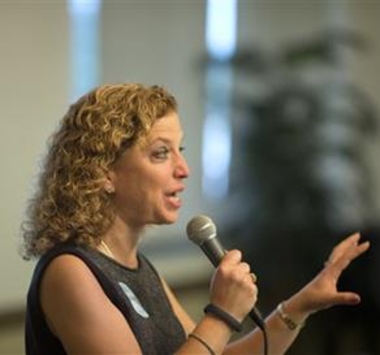Democrats say must better explain what it means to be a Dem

Washington (AP) — Democrats are struggling to answer a simple question — "What's a Democrat?" — and must do a better job of explaining their core values to voters, according to a task force formed after the party's dismal showing in the 2014 election.
"I am here to tell you the Democratic Party has lost its way," said a panel member, Kentucky Gov. Steve Beshear. The problems are not with the "party's core beliefs," he said, but relate to "our inability to convey our principles to the American people in a precise, concise and passionate way."
According to interim findings in the Democratic National Committee's report released Saturday, Democrats lack a "cohesive narrative" and need to find ways to help their party explain bedrock values such as fairness, equality and opportunity.
The 10-member task force went to work after Democrats were clobbered in November, surrendering control of the Senate to Republicans and allowing the GOP to pad its majority in the House. Republicans captured governor's offices in Massachusetts, Maryland and Illinois — all safe Democratic states in presidential elections — and strengthened their grip on state legislatures.
The losses have led to soul-searching among Democrats as they try to translate success in presidential elections under Barack Obama into midterm elections dominated by congressional campaigns. Many party leaders contend that Democrats should have run more aggressively on Obama's record last year and drawn sharp distinctions with Republicans.
"Whenever we let the other guys talk the way they talk about our president, about our leadership, about our values, we're going to lose," Connecticut Gov. Dan Malloy told the DNC on Thursday. He said too many Democrats tried to be "Republicans lite."
The nine-page report recommends a multiyear effort to prepare for the next round of congressional redistricting after the 2020 elections, given the wariness already about Republican clout in legislatures. That's where, in most states, the new boundaries for congressional district are drawn following the next census.
It calls for more financial support and training for state parties in a return to the principles behind the "50-state strategy" promoted by former Vermont Gov. Howard Dean, who led the DNC from 2005 to 2009. That approach aimed to compete in state and local elections throughout the country, even in states dominated by Republicans.
The final recommendation focuses on voting rights. It supports a constitutional amendment to enshrine the right to vote and attempts in Congress to restore portions of the Voting Rights Act. The Supreme Court in 2013 removed from federal law an effective tool for fighting voting discrimination under the act and Democrats have tried to restore those protections.
Outlining the report, the DNC's leader, Florida Rep. Debbie Wasserman Schultz, wiped away tears as she recounted her battle against breast cancer, calling it one of the reasons she is a Democrat. She noted the party's passage of the health care overhaul under Obama.
The initial findings were based on hundreds of meetings with party leaders and members of Congress and included a survey completed by 10,000 Democratic activists, Wasserman Schultz said. A final report will come out in May.
The review offers parallels to a post-mortem by Republicans after the 2012 presidential election. That study urged the GOP to focus more on year-round, on-the-ground political organizing in states and recommended that Republicans embrace a comprehensive immigration overhaul, which has faced resistance by GOP members of Congress.
A Republican Party spokesman, Michael Short, contended that Democrats have yet to come to terms with their trouncing and that "their divisive message doesn't resonate and their liberal policies don't work." Going into 2016, Democrats are a party "teetering on the edge of complete irrelevancy," Short said.
The task force emphasized rebuilding the party's bench as Republicans aggressively recruit candidates for state and local office.
In one section of the report, the DNC panel notes that since 2008, Democrats have lost 69 House seats, 13 Senate seats, 910 state legislative seats, 30 state legislative chambers and 11 governors' offices.
"Look, I'll give the Republicans credit. They spent a lot of time and money working on this for years and it paid off for them," Wasserman Schultz said in an interview. "We've certainly recognized that we have some catching up to do."
By Ken Thomas, Associated Press. Copyright 2015 The Associated Press. All rights reserved. This material may not be published, broadcast, rewritten or redistributed.
The Gayly – February 21, 2015 @ 2pm.





